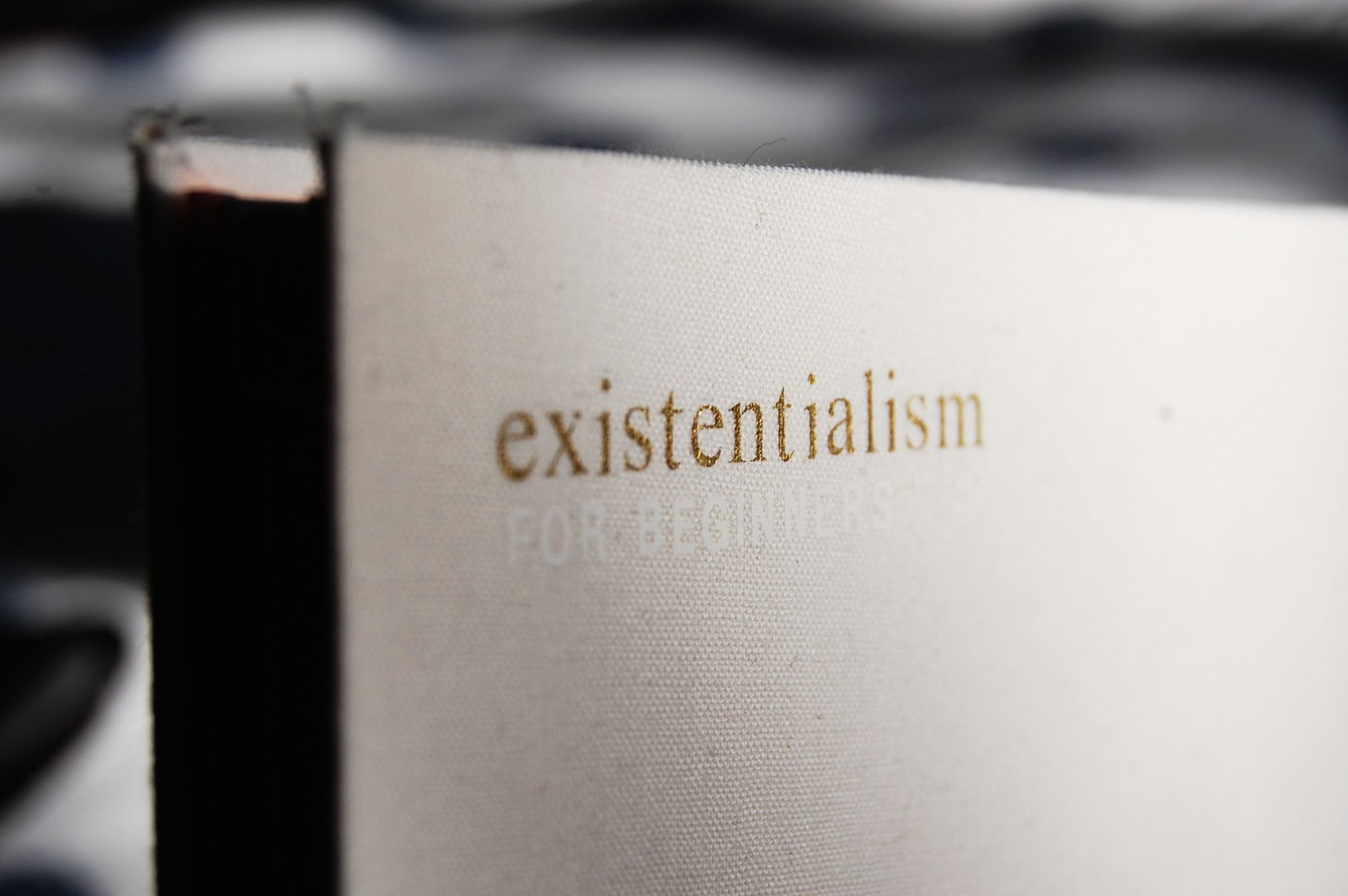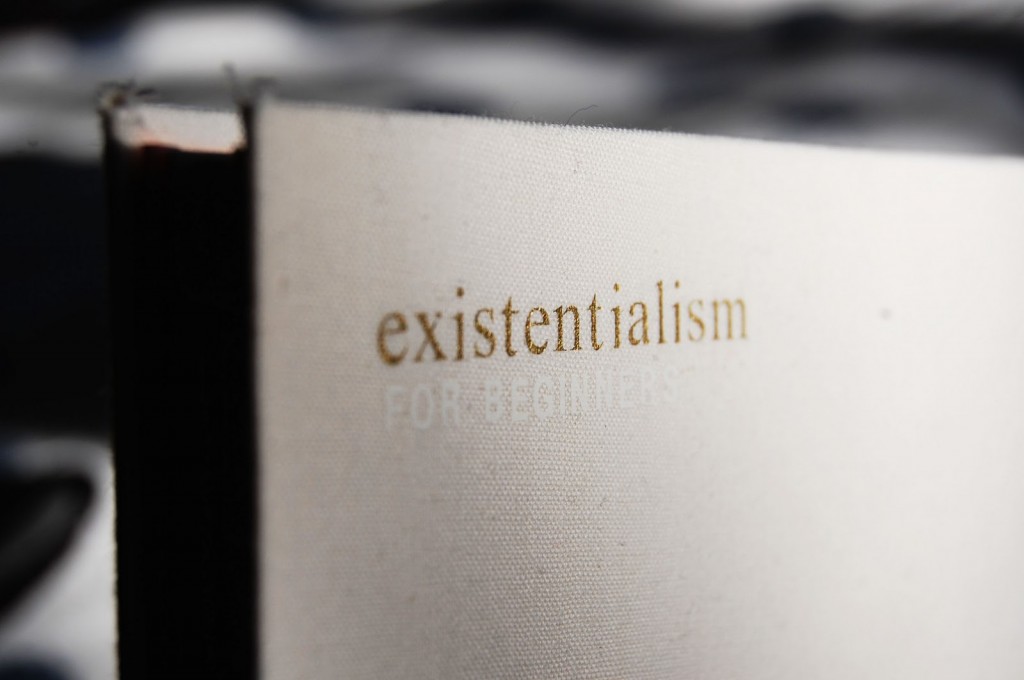Salutations, sufferers/benefactors of the human condition.
On this day, we are gathered here to mourn the loss of a great friend of ourselves: ourselves. How did we succumb to this fate? Meaninglessness. Fear not. Keep calm, and read on.
“Existentialism offers an array of interpretations because it is spread across so many different cultures. Its seemingly tortured and mixed varieties could be a result of the nature of the existentialist credo—the lonely, estranged, and alienated individual caught up in a meaningless and absurd world” (Ozmon & Craver, 2008, pp. 224-225).
I have recently noticed that some of us here at Philosophy Matters—myself in particular—talk a good deal about existentialism. However, I am not certain if we have ever really expounded upon what we mean by the term. In a previous post of mine, I barely grazed over the concept of using values and belief systems when reflecting meaning in conversation. Well, the philosophical roots of this skill are embedded within existential soil. Without becoming too technical, existentialism is closely linked with humanism and phenomenology. I will not try to distinguish among these schools of thought because—as the above quote indicates—there is a lot of overlap and a gray area in interpretation. Essentially, existentialism is “a philosophical view that emphasizes the importance of existence, including one’s responsibility for one’s own psychological existence” (Sharf, 2004, p. 642).
At this point, I think it is important to remind readers that my background is primarily that of psychology and counseling (and biology, but this discipline is not critically relevant in this case) and not philosophy per se. I am going to survey a few chief concepts of existentialism as I have learned about it in the context of my education. Firstly, I have to say that I will probably parting ways with some notable views and people in my profession because I do not consider existentialism a comprehensive personality theory; therefore, I also do not really believe in an existential therapy. I do think the philosophy underlies many effective therapeutic techniques, and I think that it should be emphasized more in training and the field. Regardless, there are some very important themes in existentialism that most experts accept. I am going to arrange the existential concepts based on the models of Seligman and Reichenberg (2010), Sharf (2004), and Yalom (1980). I have labeled the themes death, freedom, isolation, and meaninglessness.
Death
We are all going to die. Just face it. Existentialists contend that the fear of death is the cause of many of humanity’s problems. After all, our old philosopher-friend Thomas Hobbes called death the “great leap in the dark.”
Freedom
People are responsible for their own choices. This theme often puts some existentialists at odds with theists and those who follow many religions. However, I need to point out that the idea that only people are in control and manifest their own destiny is not universally accepted in existentialism or many religions such as Christianity. For example, the founders of our nation, the Deists, believed that there was a “Clockmaker God” who designed things but then allowed humankind to make its own decisions. Famous behaviorist B. F. Skinner contentiously argues against the existentialist view of freedom in Beyond Freedom & Dignity.
Isolation
We are all alone. No matter how many people we are around or how intimate our relationships with our family and friends are, we will always be susceptible to a degree of isolation. The reason is that no one else can truly walk a mile in our shoes. One of the first things I have to train beginning professional helpers is to avoid uttering the phrase “I understand.” No, you don’t. I realize that existentialism is probably starting to sound very pessimistic and a bit of a downer, but keep in mind that these are the themes of the human condition that influence our worldview, values, and belief systems. By coming to accept existential isolation and not fearing it, we can avoid many of the pitfalls of loneliness.
Meaninglessness
To me, this concept is the “brand” that I most closely associate with existentialism. I do not think that most existentialists fully coincide with Friedrich Nietzsche on this topic, but I suspect they all agree that people feeling hopeless can be problematic. Who has not asked questions such as “what’s the point of all of it?” and “what’s the meaning of life?”? Randomness outside apparently breeds emptiness inside. Searching for some sort of meaning in life is a major modus operandi for most people. I highly recommend Viktor Frankl’s Man’s Search for Meaning as a response to how one can take the concept of meaninglessness and transcend into living the good life. Frankl was a survivor of the Nazi concentration camps of World War II.
Again, I really do not wish readers to adopt a negative view of existentialism. Instead, I encourage you to consider Abraham Maslow’s—yes, the Hierarchy of Needs guy—summation that credits it…especially since he was a critic in many respects (Allen, 2003). Maslow stated that existentialism emphasized the “human predicament presented by the gap between human aspirations and human limitations (between what the human being is, what he would like to be, and what he could be)” (Maslow, 1969, p. 51).
References
Allen, B. P. (2003). Personality theories: Development, growth, and diversity (4th ed.). Boston: Allyn and Bacon.
Maslow, A. H. (1969). Existential psychology—what’s in it for us?. In Rollo May (Ed.), Existential psychology. New York: Random House.
Ozmon, H. A., & Craver, S. M. (2008). Philosophical foundations of education (8th ed.). Upper Saddle River, NJ: Pearson Prentice Hall.
Seligman, L., & Reichenberg, L. W. (2010). Theories of counseling and psychotherapy: Systems, strategies, and skills (3rd ed.). Upper Saddle River, NJ: Pearson.
Sharf, R. S. (2004). Theories of psychotherapy & counseling: Concepts and cases (3rd ed.). Pacific Grove, CA: Thomson Brooks/Cole.
Yalom, I. D. (1980). Existential psychotherapy. New York: Basic Books.


Excellent post today, I definitely enjoyed it and agree it was much needed. I’m definitely in the embrace the existentialism camp, and I think creating meaning is important.
Thanks. Yeah, there are several camps today that utilize creating meaning.
Maybe Cartesian philosophy is at the heart of existentialism – there is a very French quality to it, eg Sartre. It is also Aristotelian in its approach to the soul – of the here and now; refreshingly un-Platonic.
The universe appears to be without intrinsic meaning of itself but mankind ascribes meaning to it in order to make sense out of its (their) own existence. Maybe this urge is the father of all religion, especially in the ‘vale of tears’ context that the majority of mankind appears to spend its existence – especially historically speaking.
The area of morality is important; much of ‘existentialism’ seems to argue for an amoral nihilism – yet another prod in the direction of religion.
Contemporary atheism has, I believe, discounted this view and argues for the essential morality of humanism, which looks like the best of existentialism.
It seems a waste of existence to conceive of a universe without meaning but the superabundance of nature indicates that this is the reality.
The question for the existentialist is therefore how do I give my life meaning? And the philosophic answer demonstrates clearly that it is to be found in seeking the ‘good’ for everybody else. In this sense existentialism is truly altruistic.